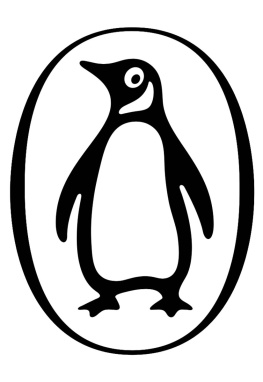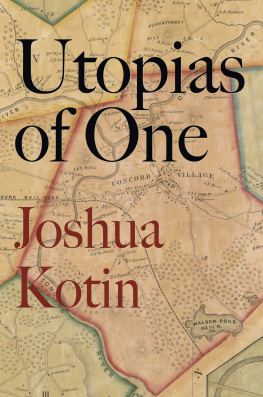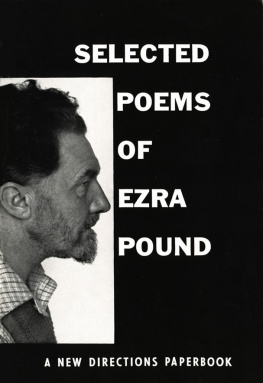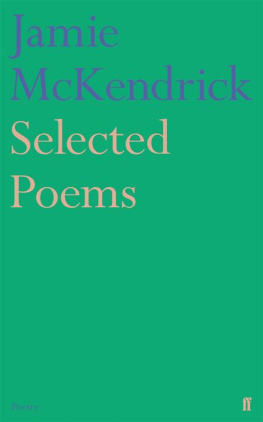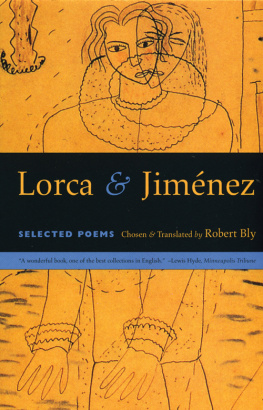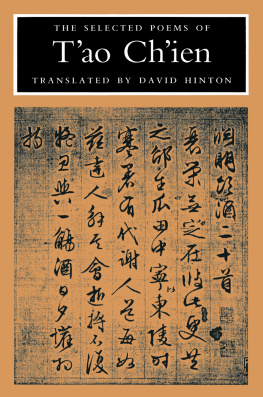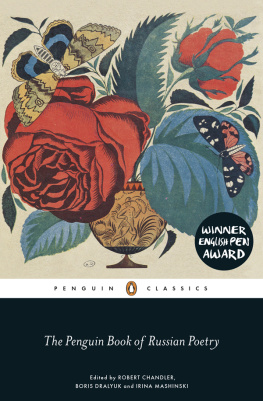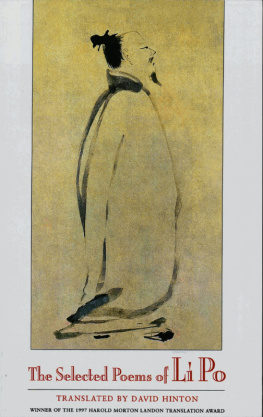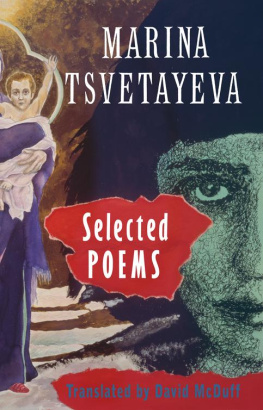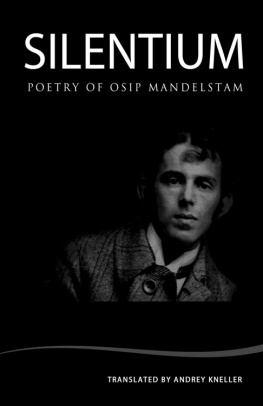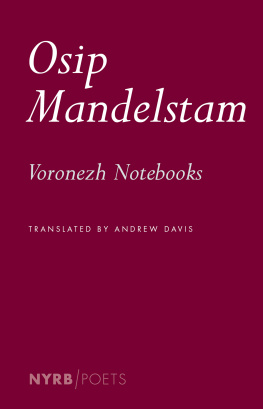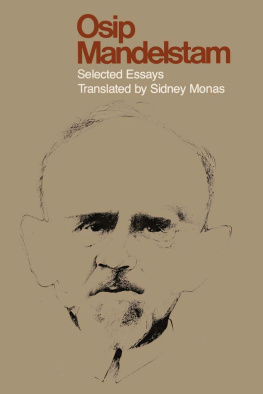Osip Mandelshtam - Selected Poems
Here you can read online Osip Mandelshtam - Selected Poems full text of the book (entire story) in english for free. Download pdf and epub, get meaning, cover and reviews about this ebook. year: 1991, publisher: Penguin, genre: Non-fiction. Description of the work, (preface) as well as reviews are available. Best literature library LitArk.com created for fans of good reading and offers a wide selection of genres:
Romance novel
Science fiction
Adventure
Detective
Science
History
Home and family
Prose
Art
Politics
Computer
Non-fiction
Religion
Business
Children
Humor
Choose a favorite category and find really read worthwhile books. Enjoy immersion in the world of imagination, feel the emotions of the characters or learn something new for yourself, make an fascinating discovery.
- Book:Selected Poems
- Author:
- Publisher:Penguin
- Genre:
- Year:1991
- Rating:5 / 5
- Favourites:Add to favourites
- Your mark:
- 100
- 1
- 2
- 3
- 4
- 5
Selected Poems: summary, description and annotation
We offer to read an annotation, description, summary or preface (depends on what the author of the book "Selected Poems" wrote himself). If you haven't found the necessary information about the book — write in the comments, we will try to find it.
Selected Poems — read online for free the complete book (whole text) full work
Below is the text of the book, divided by pages. System saving the place of the last page read, allows you to conveniently read the book "Selected Poems" online for free, without having to search again every time where you left off. Put a bookmark, and you can go to the page where you finished reading at any time.
Font size:
Interval:
Bookmark:
PENGUIN TWENTIETH-CENTURY CLASSICS
MANDELSHTAM: SELECTED POEMS
Osip Mandelshtam was born in 1891 of Jewish parents and was brought up in St Petersburg. He studied at Heidelberg University and the University of St Petersburg. The first volume of his poetry, Kamen (Stone), appeared in 1913 and was followed by Tristia (1922) and Poems (1928). His persecution by the Soviet authorities for his evident lack of ideological conformism began in earnest in the 1930s, and in 1934 he was arrested and eventually exiled to Voronezh. He was finally re-arrested in 1938. He died in Eastern Siberia, on the way to a labour camp.
James Greene was born in Berlin in 1938. He took a degree in French and Russian at Oxford and studied psychology and English literature at London University. His second collection of poems, A Sad Paradise, was published in 1990. In 1985 he won first prize in the British Comparative Literature Associations translation competition for his versions of Fernando Pessoa and in 1986 second prize in the TLS/Cheltenham Festival of Literature poetry competition. Earlier versions of some of the poems included in the present volume were published by Elek (1977), Granada (1980) and Angel Books (1988) and read at the National Theatre, the Mermaid, Riverside Studios, the Voice Box (Festival Hall), both the Oxford and Cambridge Poetry Festivals and on Radio 3. Three of his translations of Mandelshtam are included in The Oxford Book of Verse in English Translation.
OSIP MANDELSHTAM
SELECTED AND TRANSLATED
BY JAMES GREENE
FOREWORDS BY NADEZHDA MANDELSHTAM
AND DONALD DAVIE
INTRODUCTION BY DONALD RAYFIELD

PENGUIN BOOKS
PENGUIN BOOKS
Published by the Penguin Group
Penguin Books Ltd, 27 Wrights Lane, London W8 5TZ , England
Penguin Putnam Inc., 375 Hudson Street, New York, New York 10014, USA
Penguin Books Australia Ltd, Ringwood, Victoria, Australia
Penguin Books Canada Ltd, 10 Alcorn Avenue, Toronto, Ontario, Canada, M4V 3B2
Penguin Books (NZ) Ltd, Private Bag 102902, NSMC, Auckland, New Zealand
Penguin Books Ltd, Registered Offices: Harmondsworth, Middlesex, England
This selection first published in Great Britain, under the title The Eyesight of Wasps,
by Angel Books, London 1989
Revised edition first published under the present title by Penguin Books 1991
Selection, translations, Preface and notes copyright James Greene, 1989, 1991
Foreword by Nadezhda Mandelshtam copyright Nadezhda Mandelshtam, 1976
Foreword by Donald Davie copyright Donald Davie, 1977
Introduction copyright Donald Rayfield, 1988
All rights reserved
The moral right of the translator has been asserted
Except in the United States of America, this book is sold subject to the condition that it shall not, by way of trade or otherwise, be lent, re-sold, hired out, or otherwise circulated without the publishers prior consent in any form of binding or cover other than that in which it is published and without a similar condition including this condition being imposed on the subsequent purchaser
ISBN: 978-0-14-196539-0
To Ron Holmes, Maxwell Shorter and Antony Wood
Fine fingers quiver;
A fragile body breathes:
A boat sliding across
Fathomless silent seas.
1909
Few live for the sake of eternity.
But if the passing moment makes you anxious
Your lot is terror and your house precarious!
1912
And alone, infinity, I read
Your primer:
Your wild leafless herbal
Logarithm-table of prodigious roots.
1933
Like poppies, your eyebrows
Open up a dangerous path.
Why am I in love like a janissary
With this tiny volatile red
The pitiful crescent of your lips?
1934
Angelic criminal, cheeky schoolboy,
Alongside the Gothic a villain:
He spat on the spider-like law
Incomparable Franois Villon.
1937
Aortas fill with blood.
A murmur resounds through the ranks:
I was born in 94,
I was born in 92
And, clutching the worn-out year of my birth,
Herded wholesale with the herd,
I whisper through anaemic lips:
I was born in the night of January the second and third
In the unreliable year
Of eighteen-ninety something or other,
And the centuries surround me with fire.
1937
I think that the most difficult task in the world is the translation of verses, particularly of a true poet, in whose verses there is no discrepancy between the form and the content (or meaning) both of them always new and but a bit different (with no great disparity between them) and where the ego of the poet is always strikingly felt. Marina Tsvetayeva said she could write as Mandelshtam did but that she didnt want to. She was a great poet but she was greatly mistaken. She could be influenced by Mayakovsky and Pasternak and remain Tsvetayeva because they were innovators and therefore easily aped. But Mandelshtam composed verses in tradition, which is far more difficult to imitate.
Mr Robert Lowells translations are very free; Mr Paul Celans into German also free. But both are a very far cry from the original text. As far as I know the translations of Mr Greene are the best I ever saw. I cant give my opinion about the Italian translations, as I dont know Italian as well as English, French and German. As for Elsa Triolets, they are as nave and vulgar as she was.
Mandelshtam said that the contents are squeezed from the form as water from a sponge. If the sponge is dry, there would be no moisture at all. So, to render the content which Mr Greene has succeeded in doing is to give, in a way, the form or harmony, the harmony which cant be rendered in translation, the harmony which is quite simple and at the same time mysteriously complicated. Poetry is a mystery.
Nadezhda Mandelshtam, 1976
, for discussion of Mandelshtams statement in its original context.
Of Mandelshtams Octets, Robert Chandler has said that the informing energy of the poem stems from, is a part of, the universal impulse to form, which leads equally to the creation of a petal or a cupola, the pattern of a group of sailing-boats or a poem. And Mr Chandler may be right. Yet as I worked at the Octets it seemed to me on the contrary that Mandelshtam was distinguishing one kind of form from another, and was celebrating only those forms that are bent in, arced, the form of a foetus or a cradle, specifically not the open-ended and discontinuous mere pattern (rather than form) that a group of sailing-boats may fall into.
I stress this because I am inclined to see in it the clue to what is distinctive about this poet, and what is distinctively daunting about the challenge he presents to his translators. If I am right, Mandelshtams poems themselves yearn towards, and achieve, forms that are bent in, rounded, sounding a full bell-note. Moreover, because what the poems say is at one with the forms they find for the saying, we see why it is that, as Clarence Brown tells us, for Mandelshtam cognition is always recognition re-cognition, a return upon itself, a coming round again.
And nothing else, so far as I can see, will enable us to reconcile Anna Akhmatovas firm declaration, He had no poetic forerunners, with his widows no less firm admonition: Mandelshtam unlike innovators such as Mayakovsky and Pasternak composed verses in tradition
Next pageFont size:
Interval:
Bookmark:
Similar books «Selected Poems»
Look at similar books to Selected Poems. We have selected literature similar in name and meaning in the hope of providing readers with more options to find new, interesting, not yet read works.
Discussion, reviews of the book Selected Poems and just readers' own opinions. Leave your comments, write what you think about the work, its meaning or the main characters. Specify what exactly you liked and what you didn't like, and why you think so.

